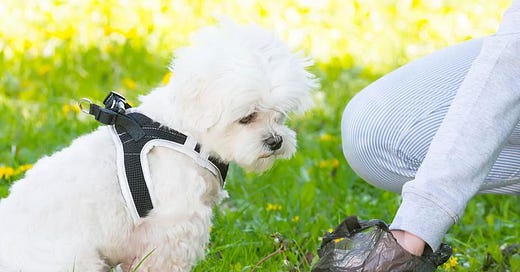If eating feces is good for dogs, it's probably good for humans too
More about the limited imagination of modern society
Let’s get right into it. This Smithsonian article goes into detail about the benefits of coprophagia (eating feces) for mammals not that different from us. This serves as a fine example of the kind of bias on practically any articles written on the topic (😒), as well as some of its potentially world-upending benefits.
Like essentially all mainstream media, benefits of coprophagia even in other animals must be couched in moral judgment, using terms such as:
“…disgusting… repulsive… inexplicable… nightmarish…”
Despite the cover image clearly showing a dejected dog as their owner puts their poop in a plastic bag. Ah, plastic, that’s SURELY better for our health and the environment!
And this is all before the author discusses potential benefits. Which, of course, are plenty.
…adult dogs may turn to coprophagia in order to correct pancreatic insufficiencies, which can limit their ability to produce insulin and other enzymes, or in an attempt to rebalance their gastrointestinal systems, says Karen Becker, a veterinarian who has written on the topic. “In veterinary medicine we often call coprophagia a behavioral problem, but we need to ask what they’re communicating,” Becker told me over the phone.
How horrifying that our beloved household pets could be “confused” to the point of doing such an unspeakable act. And yet, the poor, beleaguered reader is subjected to an endless list of other mammals who do the same: mice, birds, capyaras, guinea pigs, wolves, even pandas. Sure, pandas are not only cute, but the size and shape of similarly bipedal humans… but they too engage in this “repulsive” behaviour.
Becker cites the latter species as a particularly compelling example of a domestic pet that may eat poop in order to stay healthy, not because it’s sick. “Guinea pigs, they say, can reuse their poo up to fifty times in an hour. It happens so fast that you might not know that it’s going on,” she says.
And yet if we do this just once, it’s unacceptable. Because… why again?
“They are craving something that’s in the feces,” often something that’s missing in their existing diet. It’s an issue that comes up especially when they’re only eating processed dried foods, which may leave them without critical digestive enzymes, according to Becker. The vast majority of dogs won’t eat feces that are more than two days old, suggesting that they prefer the fresh stuff for its microbial punch, she says, especially when they’re attempting to regenerate their own gut flora.
Let’s just get one thing straight: I am not a zealot. I do not think that it is DEFINITELY beneficial in ALL circumstances to ingest feces. But the taboo is such that we are somehow oblivious to the obvious parallels between the plight of our own pets and the digestive and allergic issues that we, and everyone we know, are all are plagued by. Even Harvard was forced to admit that gut bacteria — the same ones in our own, and in other humans, intestines — “can prevent and treat many common diseases.” This research was done years ago, and yet “fringe” believers are convinced to frequent nutritional supplement stores and spend half their paycheck to get a powdered, processed form of the exact same bacteria found in our home — multiple times a day, if you have a fast metabolism.
When your friends complain about “all the new allergies kids seem to have these days,” do them a favor and remind them that other cultures solved this issue long ago. The answer is to eat your own poop — sparingly, of course — and that of your friends.
I’ll leave you with another dull-witted quote from this mainstream media article, typical of its kind:
When I asked Suen how such [coprophagic] behaviors emerged in the first place, he acknowledged that we’re not really sure.
🤔 Hm. Fascinating.



